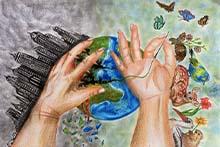

Saher Selod is an Associate Professor of Sociology at Simmons University. Her research interests include racialization, Islamophobia, Muslim Americans and Citizenship. She has published several articles in journals like Sociology Compass, the Sociology of Race and Ethnicity, and Ethnic and Racial Studies. She is a member of the Scholars Strategy Network and is an affiliated faculty member of the Islamophobia Studies Project at the University of California, Berkeley.
What topics or ideas are at the heart of your book and what new way would you like people to think about them?
I ask readers to think more expansively about race to include groups like Muslim who are not a race but experience newer forms of racism due to these policies around surveillance. The concepts my book introduces are around race, gender and surveillance. I examine how surveillance is not colorblind, but racialized and is deeply gendered. Policies and laws put into place after 9/11, institutionalized surveillance of Muslim Americans in the War on Terror. In my book, Forever Suspect: Racialized Surveillance of Muslim Americans in the War on Terror, I argue that a Muslim identity has become racialized via the institutionalization of their surveillance. Finally, I show how the process of racialization is gendered as South Asian and Arab Muslim men and women are surveilled in unique ways by the state and their fellow private citizen.
Is there anything in your personal life or that of someone you know that inspired you to care about this topic?
My research is deeply personal to me. As a South Asian Muslim American, I witnessed the immediate impact of 9/11 on my life and my family. In the introduction of the book, I provide personal encounters and experiences that my father and mother had immediately after the terrorist attacks. My dad was surveilled by the government and my mother was harassed at a gas station. It was these experiences that drove me to research and write about Muslim Americans.
What did you learn while researching or writing that surprised you?
I learned a lot of surprising things I was not anticipating while researching about Muslims, a population I am familiar with. Something new I learned was that Muslim women were resisting their surveillance by their fellow citizen by wearing bright colored hijabs. Many told me before 9/11 they used to wear darker colored hijabs, but after the attacks, they wanted to try to control the way the public viewed them, so they opted for brighter and more colorful hijabs rather than black ones because they thought it would make them seem less oppressed by the public. One participant said a stranger told her she looked “morbid” because she was wearing black pants, a black top and a black hijab. Because I do not wear the hijab, I was surprised when they told me this.
For someone who might not be interested in this book’s specific topic, why should they still read this and what do you hope they will get out of it?
I hope that my book is accessible to a wider audience than simply academics who study race, religion, or Muslims. My wish is that this book will make people feel empathy towards Muslims and illuminate their humanity. I feel the testimonies of Muslim Americans in the book could push non-Muslim readers to rethink not only unjust policies that target Muslims, but also how they interact with them socially and how the media unjustly vilifies them.
What resonance do you think your book has for parts of the South Asian diaspora, per se?
My book adds to studies of the South Asian diaspora because I show how a South Asian racial identity is impacted by the racialization of a Muslim identity. In the book I provide a brief overview of the history of South Asian migration to the United States and how their racial identity has shifted over time. I hope my book adds to the narrative how the current sociopolitical climate has once again shifted their experiences with race and racism.
Is there anything in the book you wish you could revisit?
If I had to go back and redo my study, I would have added the experience of Black Muslims to provide a more robust analysis of race and religion. Unfortunately, the majority of the scholarship on Muslims is on South Asians and Arabs. There is a real dearth of scholarship that looks at African immigrants and African American Muslims experiences with racism due to race and religion.
If there is some social or cultural or political change that could come about from people reading your book, however large or small, what would you like that to be?
My hope is that Forever Suspect shifts public opinion and policies in the United States that unfairly targets Muslims, as well as other racialized groups like African Americans and Latino/a/x populations. For example, the creation of the Immigration and Customs Enforcement (ICE) occurred after 9/11 under the Department of Homeland Security, and local law enforcement became more militarized. By understanding how surveillance in the United States is deeply racialized and unfairly targets black and brown people, my hope is we work collectively to abolish the surveillance industrial complex.
Saher Selod is an Associate Professor in the Department of Sociology at Simmons University.







